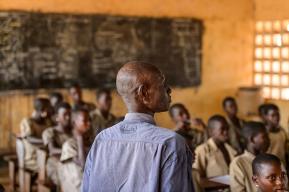Idea
Tiago Rodrigues: "The theatre is the ideal place for inventing collective memory"

Interview by Agnès Bardon
UNESCO
You first became involved with theatre as a teenager. How did it happen?
I discovered theatre when I wasn't looking for it. I grew up in Amadora, a town in the suburbs of Lisbon, and I wasn't particularly fond of theatre. I was 14 when a sociology professor, who wasn't one of my teachers, spotted me during a break. Seeing me alone, reading, he approached me and encouraged me to attend a drama class that took place every Saturday morning. As I wasn't enrolled, I didn't think it would be possible, but he insisted.
The following Saturday, I went. Meeting the other students in the class and enjoying the work on the texts convinced me to stay. But I never imagined at the time that I would make it my profession. It was at the end of high school that, as something of a dilettante and after a year's break, I took the competitive entrance exam for the Escola superior de teatro in Lisbon. I didn't get in. I came first on the list of unsuccessful candidates. Another unsuccessful student contested her ranking. The school decided she was right and accepted her, but as she had come third, the two candidates ahead of her also had to be accepted. So, with another student, Nuno Lopes, who went on to become a famous actor in Portugal, we were finally admitted. And so it was a succession of coincidences that brought me into the world of theatre.
But chance doesn't explain everything. The desire to do theatre has also been a driving force in your career.
Yes, but this desire took different forms. I didn't finish my studies at drama school because I met a Belgian company from Antwerp that was touring Portugal for the first time. I took part in workshops with these performers and followed them, a bit like the village child who runs away with the circus. This troupe opened my eyes to other aesthetics, other artists, and broadened my horizons.
When I create a play, I immediately imagine it as a form that can be translated
When I was very young, I realized that my relationship with theatre was also a relationship with the world, and with a continent: Europe. In fact, when I create a play, I always imagine it as a form that can be translated. The imaginary audience I address is never just Portuguese; in my mind, theatre is associated with the idea of nomadism. It's perhaps a slightly romantic vision, but I like to build a family around a project, a family that may be ephemeral, but that travels, telling stories and collecting narratives that feed into future projects. For me, creating a show is like packing your bags and hitting the road.
Your hugely successful play By Heart was inspired by a biographical episode: your grandmother, who was losing her sight, asked you to choose a book from her library so that she could learn it by heart. How did this personal experience become a play?
By Heart is indeed based on something intimate, the bond I had with my grandmother, who gave me a taste for literature and reading. When she asked me to choose a book that she could learn by heart, I knew that very day – I remember it well – that it was the beginning of a play. It's perhaps the text in which I expose myself most personally, but it's also the one in which I venture the furthest into the labyrinth of fiction. I'm trying to connect invisible threads between authors like Boris Pasternak, winner of the Nobel prize for literature, and my grandmother, a cook in a small village in north-east Portugal. It's also a play of imagination and evocation, because I invite ten spectators on stage to learn a sonnet by Shakespeare, the book I finally chose for my grandmother. It's a way of making tangible the phenomenon of transmission that theatre operates.
By Heart is a kind of artistic passport for me. It's a show that touches, in the most essential way, on all the subjects close to my heart. It plays on the relationship between reality and fiction, between intimate narrative and collective history. It's also a play about the power of words. My plays don't try to hold up a mirror to the world, but to create fiction rooted in reality.
Do you think there is a risk today that collective memory will be erased?
I think there is a risk that we will no longer be able to produce collective memory. And here, I'd like to make a distinction between archives and memory, that is to say between facts and the act of remembering them, and producing values from that memory. For me, memory is not knowing that a massacre of Jews took place during the Portuguese Inquisition in the 16th century. It's a capacity to share knowledge of that event and to produce thought from that knowledge.
In this sense, I think that relying on the idea of infinite and permanent availability of information presents a risk for collective memory. In the theatre, this risk doesn't exist, because we're always in dialogue with the dead, to borrow a phrase from the German poet and playwright Heiner Müller. When I stage a play by Russian playwright Anton Chekhov, such as The Cherry Orchard, I work with him. The fact that the play takes place in front of a physically present audience, which is the condition of the theatre's existence, means that from the very first minute, we're in the process of inventing collective memory.
The idea of infinite and permanent availability of information presents a risk for collective memory
In my plays, there's always a dialogue with past events, whether personal or historical, or with a past work, whether Greek tragedies or plays by Shakespeare. When I wrote my version of Antony and Cleopatra, I was obviously not trying to do better than Shakespeare, but to dialogue with him. In any case, I start with material from the past that produces something in today's reality. Ever since I was a teenager, perhaps I've been doing theatre to not be alone. And memory is what allows us to always be accompanied.
Could it be said that the question of memory is at the heart of your work, that it is in a way its common thread?
In fact, I don't do theatre to apply a theory or doctrine. I bring together people I want to spend time with because I admire them, because they have human and artistic qualities that make me want to work with them. It's usually quite late in the work process that I really understand what the play is about, and the extent to which it retains traces of other creations. My approach is very spontaneous. I only think about the aesthetics afterwards.
For example, when I wrote Dans la mesure de l'impossible, which was based on the testimonies of people working in humanitarian aid, it was only during rehearsals that I realized I was working with narrative and evocation. In this play, in fact, I don't show, I tell stories that others have lived through and which they recount. In the same way, in Sophocles’ play, we don't see Antigone dying in the cave; we see a messenger poignantly recounting what happened. I'm very influenced by this form of theatre, which asks the audience to imagine what we can't or won't show.
As director of the Festival d'Avignon, you have chosen to invite a different language each year. Why did you make this choice?
There are several reasons. The first has to do with the history of this festival, which was founded in 1947 and is an emblem of the democratization of culture in France. Over the decades, it has become an almost mythical event for the performing arts, known the world over. The desire to give this event an international dimension was initiated by the festival's founder, Jean Vilar. As early as the 1960s, he made a point of including performers from other disciplines and also cultures.
The Festival d'Avignon celebrates our ability to come together around curiosity about otherness
After nearly 80 years of existence, the festival still celebrates our ability to come together around curiosity about otherness. At the Festival d'Avignon, we are together because we are different. Inviting a language is a way of saying that we look at the world not through the prism of its borders and nationalities, but through its languages, with a very open vision.
When we invite the Spanish language, for example, as is the case in 2024, we also include performances in indigenous Latin American languages, some of which are threatened with extinction. It's a way of looking at the world through its diversity and historical complexity.
Is this open approach becoming increasingly difficult to convey?
In any case, it's increasingly vital. We live on a continent where the political and social forces that advocate closure and isolation are powerful. Artistic creation has the power to build bridges between different worlds. In this respect, I can't help projecting myself into my own history, that of a family coming to France during the Salazar dictatorship for political reasons.
Today, I have the privilege of returning to this country to take up the post of director of the Festival d'Avignon. In fact, I feel indebted to a part of society that upholds these values of welcome and hospitality. And I have a responsibility to fight for these values. Openness to other cultures, other languages and other ways of seeing the world is essential to nourish us and enable us to move forward together.
What is your relationship with your mother tongue?
A loving relationship! The more I learn other languages, the more the Portuguese language becomes the expression of my private self. I speak English, French and Spanish with a certain fluency. These are languages I've mastered sufficiently to perform on stage as an actor. I can also have conversations in other languages, like Italian. But when I write a play, it's in Portuguese, because it's the only language that allows me to be really free. Portuguese is the only language in which I can make mistakes on purpose. If I make a mistake in French or English, it's a mistake. If I make a mistake in Portuguese, it's poetry.
If you had to choose just one book, which would it be?
The question of the ultimate, definitive book is a very difficult one. When I was thinking about a book for my grandmother, I drew up a list of possible works. Then I wrote to George Steiner, Professor of Literature at Cambridge University and a great scholar. I never received a reply, and finally I chose Shakespeare's Sonnets. After creating By Heart, I had the opportunity to go to Cambridge and meet him.
He had actually never received my letter because he was retired from Cambridge University, and it had never reached him. I asked him what he would have said to me if he had received it. As to the choice of Shakespeare, he simply said: ‘Not bad’. He added I was lucky not to have received his reply, because he would have told me there is no last book, only the next one. If I really had to choose one book out of all of them, I'd probably have to do a play to find the answer.
More GUESTS in The UNESCO Courier






